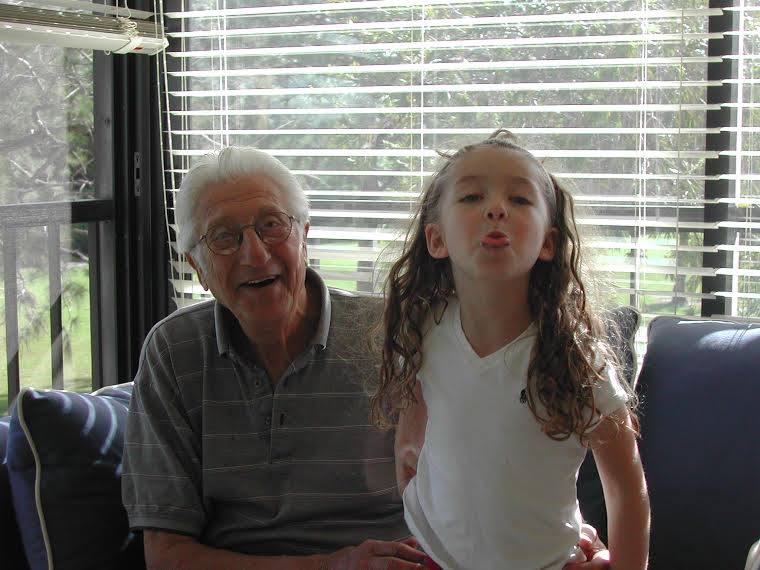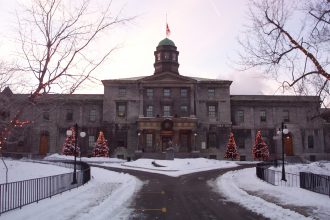My earliest memories of Montreal are of scattered Legos on a royal blue carpet. We are in my grandparents’ old apartment in Côte Saint-Luc, and I can see two cousins in my peripheral view, sitting near me, and playing with other toys. It’s probably summertime, but I can’t tell because I’m facing the rippled eighties marble, plastered against the wall of the half-den converted into a playroom.
For me, Montreal was always a destination, but never quite a second home. My mother grew up here with my grandparents and her two siblings in a suburb called Saint Laurent. She and my aunt then moved to Toronto, but my grandparents remained here. And so almost every year, in addition to meeting them for a week in Boca Raton, Florida, my father, mother, brother and I would make a (warm-weather) pilgrimage from Toronto to Montreal.
For me, Montreal was always a destination, but never quite a second home.
For eighteen years, being in this city meant being with Grandma and Grandpa. We would pull up to their condominium, first in Cote St Luc and later — at their cooler, un-carpeted place on Sherbrooke — with our cluttered Acura, staggering out to give them big hello hugs. We would spend the three or four days with them, and until this year, every freeze-frame conception I had of Montreal was conflated with images of my grandparents.
I remember my grandfather — strutting out of his room whilst combing his thick white hair — urging my grandma to, “Take the kids to Snowdon Deli for lunch! I’m in the mood for smoked meat!” I remember shady days in Westmount Park, trying to climb the Big Tree. I remember the fish tank in the Chinese dive we’d frequent with my cousins, and how we would stand in front of it, mesmerized, until our food came.
I remember the way I looked forward to watching my grandfather interact with strangers, the way he would make them laugh by cursing in French or patting them on the back and calling them, “Big fella,” or “Miss America.” I can see strolls down St Laurent and Laurier in the daytime, walking past his office and dipping in and out of furniture stores with my grandmother and mom. Mostly, I’ve remembered Montreal with a sort of aged glow — a city made of old stone and wood with a warmth and an earnestness that Toronto seemed to lack.
When I came here for school in late August, the routine began more or less the same as it always had. After dropping off my stuff and signing my lease at Rez, I was promptly at Grandma and Grandpa’s apartment, double-kissing hello, and, of course, discussing dinner plans. Things started to change in September. Suddenly, St. Laurent was only a nighttime activity, and my daytime routines were limited to a four-block radius from University to Parc and up to Pins. La Belle Provence was no longer a place Grandpa occasionally enjoyed a steamie, but a place to scarf down poutine whilst wasted only to regret it the next morning.
Things started to change in September. Suddenly, St. Laurent was only a nighttime activity, and my daytime routines were limited to a four-block radius from University to Parc and up to Pins.
I often went to my grandparents’ home for dinners on the weekends and sometimes stayed over, and being there still felt comfortable in the way it always did. Increasingly, though, it simply felt like my Montreal was really two worlds — a familiar one I had known for eighteen years, and a strange, neon-hewn one I became acquainted with over the course of first semester. Often, heading back east on Sherbrooke, I found myself torn between them.
In late October, when my grandfather got sick, yet another dimension was added to my understanding of this city: a sort of purgatory. I would often Uber to the hospital alone, meeting my grandma with goodies I had grabbed on my way out of the Premiere Moisson in Redpath. At the end of the evening, when the waiting room of the ICU reluctantly cleared, I would again head home alone, looking out the window at buildings I now recognized — Stewart Bio, McMed, Leacock. Jumping between my two Montreals on an almost daily basis, I started to make sense of the broader neighbourhood that actually connected my childhood walkways to my student stomping grounds.
In late November, my grandfather passed away. With him, he relegated a cherished piece of what I had always seen in Montreal to the past. In many ways, he was this city: an old gem who packed a punch; a man who, like this place, so sincerely wanted to just have fun. It was through my grandpa’s presence that my perception of Montreal was fostered, and it was in his departure that it would come to be complete.
In many ways, he was this city: an old gem who packed a punch; a man who, like this place, so sincerely wanted to just have fun.
In the wake of my grandpa’s death, the memories I have of the city seem to have finally woven into the life I live in it every day. Rather than running along parallel lines, Montreal’s daytime and nighttime networks, its delis and its clubs, coexist for me. I don’t think I will ever forget the particular frames, smells, phrases and foods that connoted Montreal for me as a child, just like I don’t think I’ll ever not sigh at the gaping sight of Montreal General Hospital. But those things only add to the foundation on which I will build the rest of my time in this city, however long that may be.
For me, Montreal is both blue carpets and black bodysuits. It’s daytime steamies and nighttime poutine. I can no longer say Montreal is just a destination. In fact, it might well be a second home.


